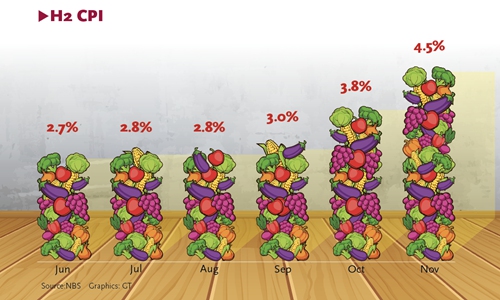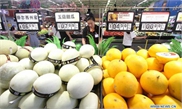
Photo: GT
Soaring pork prices pushed China's inflation level to a 94-month high in November, according to official data released on Tuesday morning.But experts reassured that the country's CPI rise will slow in 2020 as trade frictions calm and pork prices are corrected.
China's consumer price index (CPI), a main gauge of inflation, rose 4.5 percent year-on-year in November, beating market expectations of 4.2 percent, according to data released by the National Bureau of Statistics.
The November reading was 0.7 percentage points up from October's CPI level.
Food prices grew 19.1 percent year-on-year in November, compared with 15.5 percent in October, while non-food prices gained 1 percent, 0.1 percentage points higher than in October.
Pork prices rose 110.2 percent year-on-year, contributing 2.64 percentage points to overall CPI growth. This rise spilled over into the prices of poultry, which was recorded at 74.5 percent in November, and eggs at 10.1 percent.
Affected by African swine fever and cyclical factors, pork prices have risen visibly during the past few months, becoming the main driver of CPI expansion. Despite this, prices have started to fall recently as production is gradually restored.
"Soaring pork prices should have reached an upper limit already," Tian Yun, vice director of the Beijing Economic Operation Association, told the Global Times on Tuesday. He predicts the CPI rise will slow after the first quarter of 2020.
The brewing trade war, which pushed up prices for a number of agricultural products, has also increased the China's inflation level, said Li Chunding, a professor at China Agricultural University.
"But I don't think it indicates serious inflation or that China's economy is 'overheated.' The high CPI reading won't last as trade frictions calm and pork prices are corrected," he told the Global Times.
Tuesday's data also showed that China's producer price index (PPI), which measures the cost of goods at the factory gate, dropped 1.4 percent year-on-year in November.



